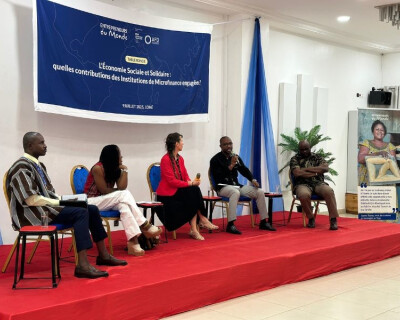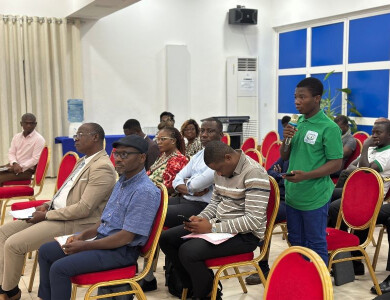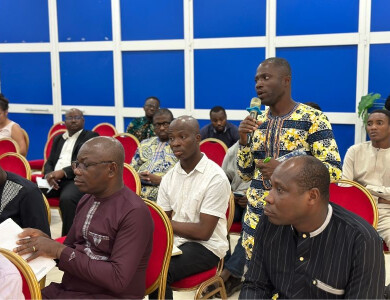
70 people gathered in Lome, Togo to discuss the social and solidarity economy and committed microfinance institutions
On July 9, 2025, in Lomé, 70 participants gathered to discuss the structuring of the social and solidarity economy and strengthen ties between actors involved in microfinance.
For the past decade, the United Nations has fully recognized the contribution of the social and solidarity economy (SSE) to poverty reduction, gender equality, decent employment, environmental protection, and social cohesion.
West Africa, and Togo in particular, is experiencing a boom in SSE initiatives. Despite their dynamism, they face difficulties in accessing finance, low institutional recognition, and a lack of sectoral structuring.

On July 9, 2025, Entrepreneurs du Monde organized a round table discussion in Lomé entitled “The Social and Solidarity Economy: What Contributions Can Committed Microfinance Institutions Make?” to stimulate reflection on the structuring of this sector and strengthen ties between stakeholders in Togo.
The aim was also to learn from the experience of social microfinance institutions.
Around the table:
– Yawo Foly Adzomada, Executive Director of Assilassimé Solidarité,
– Badjoumbena Bakole, Founder and Managing Partner of Auréole Monde Innovation,
– Mohamed Attanda, Executive Director of the Microfinance African Institutions Network (MAIN)
– Baudouin Kola, President of the Maison des Coopératives du Togo, Regional Delegate of ICA Africa
What is the role of the social and solidarity economy in Africa?
The social and solidarity economy has long been rooted in African practices, as it formed the basis of pre-colonial economic models based on a community economy, before the economy became structured around exports during the colonial period.
In Togo, forms of collective entrepreneurship and financial cooperatives emerged in the 1990s. Social entrepreneurship subsequently developed, but without the right tools, these initiatives remain fairly fragile.
International conferences on social enterprise and CSR have promoted dialogue with the Togolese government on this subject in recent years. An interministerial committee has worked on a draft bill, which still needs to be further developed.

Can MFIs claim to belong to the social and solidarity economy?
Microfinance was popularized with the aim of being a tool for combating poverty. However, certain localized abuses have demonstrated the need to regulate practices.
At the regional level, this is what the Central Bank of West African States has done by establishing a strict regulatory framework. At the international level, the Universal Standards for Social and Environmental Performance Management have become a benchmark in this area.
Among the wide variety of microfinance institutions—in terms of mission, status, and approach—those that pursue social and environmental objectives that are incorporated into their day-to-day management and rigorously monitored are fully in line with the SSE.
What is the reality on the ground?
What better way to learn about the practical challenges faced by social economy actors than through testimonials from the field?
This testimony came from two voices: Yawo Foly Adzomada, Executive Director of Assilassimé Solidarité, a social microfinance institution created by Entrepreneurs du Monde in 2012, and Badjoumbena Bakole, founder of Auréole Monde Innovation, a social enterprise that markets washable menstrual products.
The key principles of the social and solidarity economy were the common thread running through the discussion.
The social or environmental purpose of economic activity
It is embedded in the DNA of both organizations and is translated into specific objectives, monitoring indicators, and good management practices for each.
Assilassimé’s mission is to offer social microfinance services tailored to vulnerable people with limited access to traditional financial institutions, in order to develop income-generating activities and improve their living conditions.
Auréole Monde Innovation was inspired by the vision of an egalitarian and sustainable world where everyone can exercise their rights to dignity and menstrual health.
Transparent and democratic governance
Auréole Monde Innovation’s governance is based on a board of partners, 40% of which is made up of a civil society organization, 30% of an individual, and 30% of another individual. The research, development, and social action officer ensures that the social vision is respected in decision-making, and every effort is made to ensure that everyone’s voice is heard and given equal weight.
Assilassimé’s board of directors is composed of five members, four of whom work in the social sector. The directors regularly meet with staff and beneficiaries and base their decisions on internal reports.
Regulation of profitability
For committed microfinance institutions, the legal framework in West Africa is very demanding. Compliance standards relating to lower interest rates, including for small loans, and in terms of identity documents, restrict the ability to reach the most excluded people while balancing the books.
In all cases, it is essential to regulate profitability and set rules with stakeholders, such as reinvesting the majority of profits in business development or paying a portion of profits to a non-profit entity—a choice made by Auréole Monde Innovation.
The environmental issue
At Auréole Monde Innovation, this commitment is reflected in the production and distribution of washable menstrual products, which reduce waste in local areas.
Assilassimé Solidarité offers financial services to help people purchase modern, healthy cooking and lighting equipment. It has developed agroecology training courses for farmers and has formed a partnership with Miawodo on waste management.
Financing social enterprises
The role of social investors, including international cooperative banks, has been highlighted. The gap between the subsidies available for start-ups and structuring organizations, and those that finance development and scaling up, poses a real problem.
This is demonstrated in this publication produced by a group of French NGOs. Committed microfinance institutions can themselves play a role in financing SSE initiatives.
The desire of SSE actors to join forces
More than 70 professionals from the social and solidarity economy, civil society, microfinance institutions, and specialized Togolese media actively participated in the event. This success reflects the need for local actors to have spaces for exchange to discuss the challenges, opportunities, and difficulties they encounter.
To continue the discussion, Entrepreneurs du Monde will participate in the Global Social and Solidarity Economy Forum (GSEF) at the end of October, which will be held this year in Bordeaux.
The SSE will also be the focus of the next issue of the Traverses series, published by Groupe Initiatives, a collective of professional international solidarity associations. This issue is led by Entrepreneurs du Monde and GRET Madagascar.


